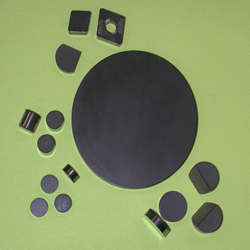Polycrystalline superabrasives, i.e. polycrystalline diamond
and CBN products, constitute a more recent family of superabrasives, which
have been designed for machining respectively nonferrous and ferrous materials.
I. Polycrystalline diamond (PCD) is used for machining a wide
variety of nonferrous and nonmetallic materials, a revolutionary product
for toolmakers manufacturing finished cutting tools.
|
|
PCD blanks combine the hardness and
abrasion resistance of single crystal
diamond with the impact strength
of tungsten carbide, which provides
a very good support to the diamond
abrasive layer. They offer higher
material removal rates, faster cutting
speeds, improved quality and longer
tool life. Since ferrous materials
tend to form carbides at high temperature,
PCD blanks are only suited for nonferrous
materials such as tungsten carbide,
ceramics, manufactured wood, plastics
and composites.
II. Polycrystalline CBN products
(PCBN) have thus been designed
for machining ferrous materials (since
cubic boron nitride does not chemically
react with carbide-forming elements)
They are therefore perfectly suited
for materials such as hardened steel,
nickel alloys and superalloys.
 They also consist of fine particles
(i.e. micron sized crystals) of CBN,
bonded to a cemented tungsten carbide
substrate, providing increased hardness
and wear resistance, as well as a
good support to the CBN abrasive
layer. PCBN products not only offer
high thermal resistance but they
also enjoy the same exceptional properties
as PCD blanks, i.e. high wear and
impact resistance, greater material
removal rate, etc… They also consist of fine particles
(i.e. micron sized crystals) of CBN,
bonded to a cemented tungsten carbide
substrate, providing increased hardness
and wear resistance, as well as a
good support to the CBN abrasive
layer. PCBN products not only offer
high thermal resistance but they
also enjoy the same exceptional properties
as PCD blanks, i.e. high wear and
impact resistance, greater material
removal rate, etc…
PCD and PCBN products have brought
about considerable productivity improvements
and significant cost savings, while
enhancing the quality of the finished
tools.
|



